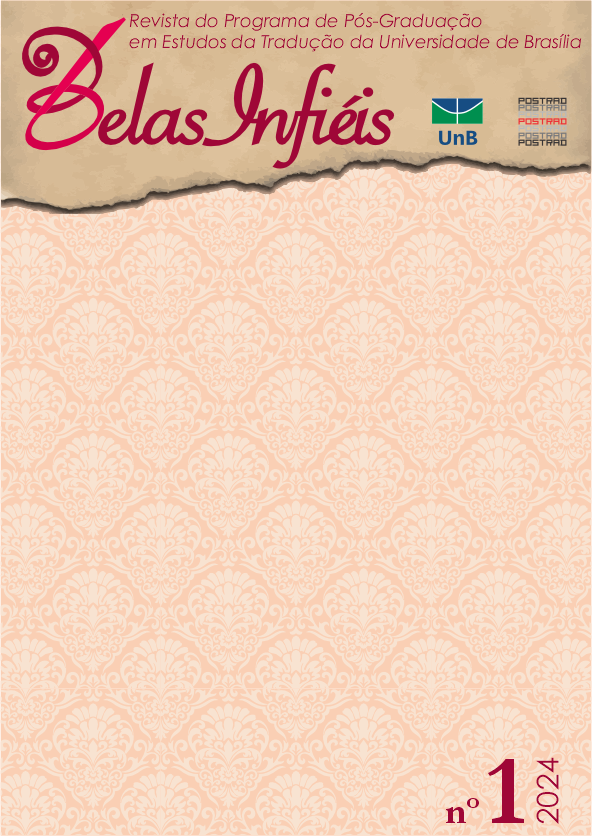Applying MTPE to Sworn Translation: Bonus or Burden?
DOI:
https://doi.org/10.26512/belasinfieis.v13.n1.2024.54644Keywords:
Sworn translation. Machine translation post-editing. Personal documents. Human translation. Temporal effort.Abstract
This article reports on a study that aimed to investigate the productivity of machine translation post-editing (MTPE) applied to the sworn translation of personal documents. More specifically, it aimed at describing some of the challenges of post-editing birth certificates and ID cards from Brazilian Portuguese into American English, as well as analyzing the time spent on the MTPE of such documents in comparison to manually translating them. The methodology consisted of timed and annotated translation using MTPE and human translation (HT). It also included the description of elements and final formatting that is characteristic of sworn translation. The PDF files were converted to Word using an OCR software. Our results indicated that MTPE might be more productive than HT when time spent on OCR and formatting is not considered. However, since the sample size was limited to eight documents and two types of documents, the results cannot be generalized.
Downloads
References
Anoreg/BR divulga Manual de Integração dos Cartórios e alerta sobre prazo de integração – ANOREG. (n.d.). Retrieved July 1, 2024, from https://www.anoreg.org.br/site/manuald-integracaodoscartorios/
Albuquerque, A. F. de. (2023). The Impact and Challenges of Using Machine Translation Post-Editing in Sworn Translation of Brazilian Personal Documents [Undergraduate Thesis, Universidade Federal de Pernambuco].
Barros, L. A., Babini, M., & Aubert, F. H. (2010). Terminologia e tradução juramentada: questões de tipologia textual e equivalência terminológica interlinguística Português-francês-italiano. Filologia e Linguística Portuguesa, 12(2), 233-249. DOI: 10.11606/issn.2176-9419.v12i2p233-249
Bowker, L. (2002). Computer-Aided Translation Technology: A Practical Introduction (Didactics of Translation). University of Ottawa Press.
Cadastro Nacional de Tradutores Públicos e Intérpretes Comerciais – CNTPIC. (n.d.). Retrieved September 28, 2024, from https://www.gov.br/mdic/pt-br/assuntos/outros-assuntos/uncategorised/cntpic-drei
Carl, M., Dragsted, B., Elming, J., Hardt, D., & Lykke Jakobsen, A. (2011). The Process of Post-Editing: A Pilot Study. Copenhagen Studies in Language, (41), 131-142.
CRC integra os Cartórios de Registro Civil de todo o País. (2020, August 27). Blog Do Registro Civil. Retrieved July 1, 2024, from https://blog.registrocivil.org.br/2020/08/27/crc-integra-os-cartorios-de-registro-civil-de-todo-o-pais/
Goedert, A. O. (2015). Tradução Juramentada e as Modalidades de Tradução: o caso dos históricos escolares (Dissertação de mestrado, Faculdade de Filosofia, Letras e Ciências Humanas, Universidade de São Paulo).
Gotti, M., & Šarčević, S. (2006). Insights Into Specialized Translation (2nd ed.). Peter Lang.
Green, S., Heer, J., & Manning, C. D. (2013). The Efficacy of Human Post-Editing for Language Translation. ACM Human Factors in Computing Systems (CHI).
Guedes, R. (2016). Tradução especializada: um mergulho nas especificidades do gênero jurídico. Tradução em Revista, 2(21). DOI: 10.17771/PUCRio.TradRev.28028
Gutiérrez Arcones, D. (2015). Estudio sobre el texto jurídico y su traducción: características de la traducción jurídica, jurada y judicial. Miscelánea Comillas: Revista de Ciencias Humanas y Sociales, 73(142), 141-175.
Holmes, J. S. (2000). The Name and Nature of Translation Studies. In L. Venuti (Ed.), The Translation Studies Reader (pp. 172-185). Routledge.
Hutchins, W. J., & Somers, H. L. (1992). An Introduction to Machine Translation. Academic Press.
Killman, J., & Rodríguez-Castro, M. (2022). Post-editing vs. translating in the legal context: Quality and time effects from English to Spanish. DOAJ (DOAJ: Directory of Open Access Journals). DOI: 10.2436/rld.i78.2022.3831
Koponen, M., Mossop, B., Robert, I. S., & Scocchera, G. (2021). Translation Revision and Post-Editing: Industry Practices and Cognitive Processes (1st ed.). Routledge.
Krings, H. (2001). Repairing Texts: Empirical Investigations of Machine Translation Post-Editing Processes. The Kent State University Press.
Koglin, A. (2015). An empirical investigation of cognitive effort required to post-edit machine translated metaphors compared to the translation of metaphors. The International Journal for Translation & Interpreting Research, 7(1), 126-141. DOI: ti.106201.2015.a06
Mayoral, R. (2000). Sworn Translation and Its Functions. Fédération Internationale des Traducteurs (FIT) Revue, Babel, 46(4), 300-331. DOI: 10.1075/babel.46.4.03may
Mesa-Lao, B. (2013). Introduction to post-editing - The CasMaCat GUI. In Proceedings of the Center for Research and Innovation in Translation and Translation Technology Conference: SEECAT Project. Copenhagen Business School, Denmark.
Nascimento, L. de A. e S. (2006). Investigating Norms in the Brazilian Official Translation of Semiotic Items, Culture-Bound Items, and Translator’s Paratextual Interventions [Doctoral dissertation, Universidade Federal de Santa Catarina].
Nitzke, J., & Hansen-Schirra, S. (2021). A short guide to post-editing (Translation and Multilingual Natural Language Processing, 16). Language Science Press. https://doi.org/10.5281/zenodo.5646896
O’Brien, S. (2006). Machine-Translatability and Post-Editing Effort: an empirical study using Translog and Choice Network Analysis. [Doctoral dissertation, Dublin City University, Ireland].
O’Brien, S. (2007). An empirical investigation of temporal and technical post-editing effort. Translation and Interpreting Studies (TIS), 2(1), 83–136.
O’Brien, S. (2010). Introduction to Post-Editing: Who, What, How and Where to Next? In Proceedings of the 9th Conference of the Association for Machine Translation in the Americas: Tutorials, Denver, Colorado, USA. Association for Machine Translation in the Americas.
Oliveira, B. M. de. (2012). Tecnologias da tradução no trabalho de tradutores jurídicos/juramentados: estudo de caso. Abehache, 2(3), 191-205. Retrieved from https://revistaabehache.com/ojs/index.php/abehache/article/view/84/83
Omazić, M. & Šoštarić, B. (2023). New resources and methods in translating legal texts: machine translation and post-editing of machine-translated legal texts. In L. Kordić. (Ed.), Language(s) and law (pp. 71-83). Faculty of Law Osijek.
Ramos, F. P. (2014). Legal Translation Studies as Interdiscipline: Scope and Evolution. Meta, 59(2), 260-277. DOI: 10.7202/1027475ar
Sawant, D. (2013). History of Translation. Literary Endeavor, 4, 109-115.
Smartcat. (n.d.). Why Smartcat is safe to use. Retrieved from https://www.smartcat.com/security/
Downloads
Published
How to Cite
Issue
Section
License
Copyright (c) 2024 CC BY

This work is licensed under a Creative Commons Attribution 4.0 International License.
Given the public access to this journal, the texts are free to use but requires the recognition of the original authorship and initial publication in this journal to be properly stated.
 The journal allows the use of works published for non-commercial purposes, including the right to submit the work to publicly accessible databases. Published contributions are the sole and exclusive responsibility of the author(s).Â



















